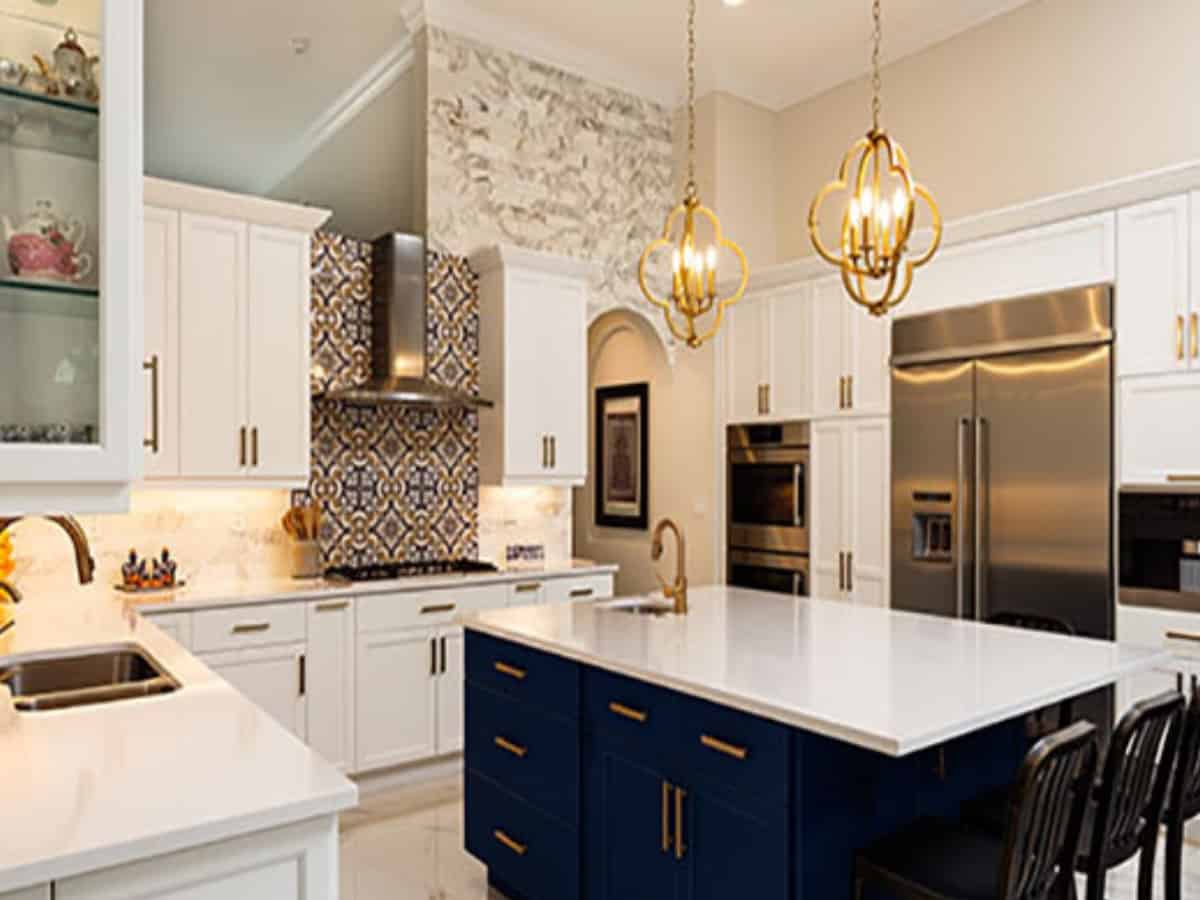Granite countertops are one of the most durable and long-lasting options for countertops. Due to this, they are an extremely popular and reliable option for homeowners.
Granite stands out among its alternatives not only because of its practical benefits but also its aesthetic ones. It is a very gorgeous stone with a dense and strong base color that is commonly in beige or cream tones. It is embellished with ornate veins and patterns that add movement and fluidity to the design without being too cluttered.
Its durability and longevity come from its hard structure. Granite is an igneous rock. It is formed through the recrystallization of minerals caused by the cooling and solidification of magma. Therefore, it is a highly resistant stone to most environmental factors.
However, it is not possible to give a definitive answer to the question “How long do granite countertops last?” The answer to that depends on various factors that will significantly impact the longevity of the countertops. These factors include the qualities of the stone such as its quality and strength. On the other hand, your treatment of the stone, like maintenance and protection also plays a huge role in how well the countertops hold up over time.
Quality
The quality of the stone is one of the most important factors that will affect the durability of the stone. Granite is a natural stone, therefore there will naturally be inconsistencies and differences between slabs. Each piece of granite has a unique composition and appearance.
The geographical origin of the granite plays an important role in how high quality it is. Stones that are extracted from different quarries will have different levels of quality as they will have different hardness levels and minerals. Some regions then have similar yields, however it is impossible to fully predict.
High-quality granite is less porous than low-quality ones. Therefore, high-quality granite countertops will be more resistant to wear and tear, showing less damage. Moreover, less porous granite surfaces will be less prone to stains, discoloration, and bacteria because of fewer pores, so the stone won’t be as vulnerable to moisture and liquid spills.
The strength and thickness of the slab
The thickness and strength of the slab are other contributing factors to the durability and endurance of granite as a countertop material. Understanding how these factors influence the countertops over a long time is crucial before making this big investment because you can base your decisions based on this information.
For example, you might decide on a thicker slab than you would have otherwise to ensure stable and long-lasting countertops.
The thickness of the slab is fundamental for its durability and stability. Thicker countertops will exhibit a greater endurance to chipping cracking or any other structural damage that can occur. On top of being more durable and strong, thicker slabs will provide a more substantial look and luxurious appearance to the countertops.
Heavy pots, pans, and appliances are commonplace in the kitchen. A thicker slab will be able to better accommodate the needs of those heavy objects and withstand the impact compared to thinner ones. Moreover, the added density will make it more durable against accidentally dropped objects.
Proper sealing
As mentioned before, granite is a natural stone and therefore it is porous. In other words, it has microscopic holes all over it that allow dirt, food particles, and liquid spills to get in and cause stains or bacterial growth on the countertops.
To prevent these unwanted consequences, granite countertops are sealed. The sealant creates a barrier between the stone and the outside world, inhibiting the penetration of spills into the stone and ensuring they can’t cause damage. Properly sealed granite countertops will be able to resist these factors without a problem.
After they are installed, you need to reseal your countertops regularly to replenish the sealant that wears off during daily use of the counters.
Depending on the quality of the sealant that is used, resealing them annually in the generally recommended amount. If your countertops aren’t used regularly, you might need to reseal them less frequently. You should regularly assess the countertops and reseal them once you notice that the shine is starting to dull.
Maintenance
Your maintenance practices regarding the countertops will significantly influence the durability of the granite. With proper care and attention, you can preserve the aesthetic beauty of the countertops and enhance their resilience.
The most important thing to remember is that regular cleaning is a must. You can use a mild dish soap with a soft rag or sponge to wipe the granite countertops daily.
You should avoid harsh cleaners or abrasive tools as they can cause damage to the integrity of the stone over time. You can use a disinfectant cleaner every once in a while, but you should read the ingredient list to ensure it doesn’t contain acidic or extreme chemicals.
In the case of a spill, prompt intervention is essential. You should wipe the spilled liquid with a clean cloth or paper towel immediately. Don’t let the spill linger so it doesn’t have to seep into the stone. Liquids like red wine, coffee, and oils have a high potential of causing stains.
Heat and scratch resistance
The amazing endurance of granite is thanks to its resilience against heat and scratching. Granite naturally has a very high melting point, therefore it is resistant to heat levels that can occur in a normal kitchen.
While the granite slab itself is highly resistant to heat, the sealant on top of it is not. In other words, placing hot trays straight out of the oven on the countertops can cause damage to the sealant. To ensure that the barrier stays intact, you should use trivets.
Similarly, granite can resist scratches pretty well. However, it is not indestructible. To confirm that the countertops can maintain their longevity avoid cutting directly on the countertops. The sharp knife can harm the granite over time, you should use cutting boards instead.
In short, to answer the question “How long do granite countertops last?”, the necessary maintenance and care should be considered alongside the natural durability of the stone.
They can serve the house they were installed in for more than 20 years. Granite can even last for 100 years with exceptional care and attention. Granite countertops emerge as not just a beautiful option for your kitchen but also one that will last you a lifetime.


